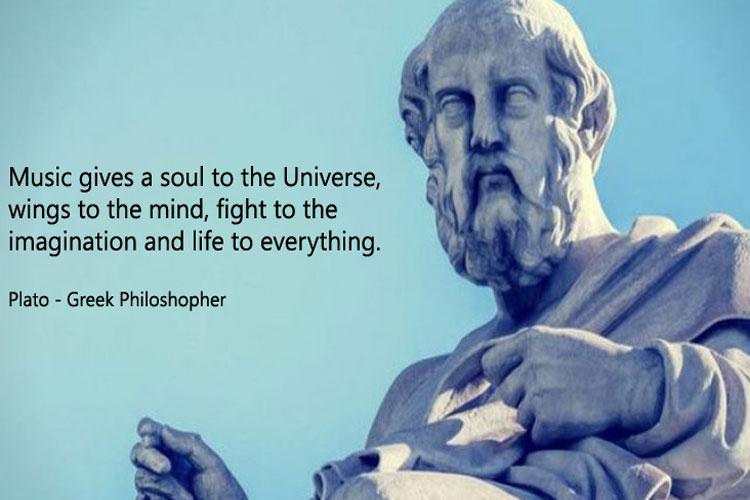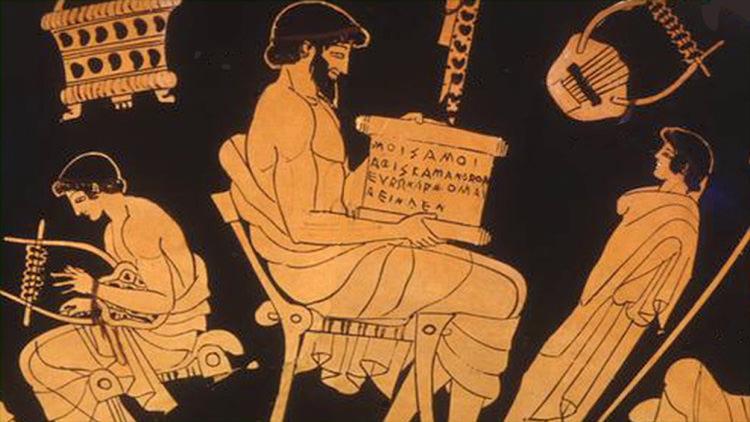Music in ancient Greece: A spiritual gift
''Music is the movement of sound to reach the soul for the education of its virtue'' Plato
Introduction
Music! A sacred heritage! Since prehistoric times, music has played an important role in life, providing essential skills necessary for human culture. Our knowledge of music in ancient Greece comes from various sources (ancient texts, ancient idols, amphorae, ancient illustrations). Moreover, all important ceremonies (weddings, funerals, competitions, sacrifices and symposia) were always accompanied by music. From the above, it is understood that music played a very important role in every aspect of life for the ancient Greeks. But where does the word ''music'' come from?
The etymology of the word ''music''
According to the writings of ancient Greek philosophers and poets, the word ''music'' is derived from the Greek word ''Muses''. According to Greek mythology, the Muses were nine goddesses, daughters of Zeus and Mnemosyne. They were the patron goddesses of literature, science and art. Today, the word music means the art of sound. For the ancient Greeks, however, music was the means of spiritual maturity. It wasn't only the art of sound, but an inseparable unity of speech, sound and movement. It is understandable that Greek culture influenced other cultures, which borrowed the greek world ''μουσική'' (mousiki) and spread it from there to almost all of Europe (e.g. Music-english, musique-french, musica-italian...). In some languages (e.g.Native American languages from North America) music wasn't a separate category. These languages don't have a word for music, but they do for singing, for dancing and for playing instruments. However, over the years, the idea of music as an autonomous art and a common language of communication spread throughout the world. At this point, I would like to reiterate a phrase of the poet Henry Wadsworth Longfellow: ''Music is the universal language of all mankind''.
The importance of music for the ancient Greeks
The life of the ancient Greeks was full of music. There are countless references to this sacred art in their historical, literary and philosophical texts. For the ancient Greeks, music played a significant role in the education of young people, because they knew the power of music and its educational value. Music has the amazing ability to strengthen the connection between body and mind, helping them to work together and form an inner sense of rightness, a sense of a complete human being. The effect that music had on the human soul was obvious to the Greeks. This passion for music and the desire to discover its paths, led the Greeks to devote a number of theoretical studies to have a rich written tradition in our days. For the Greek philosopher and the ''Father'' of Music Theory Pythagoras, music was a mathematical science and represented the celestial harmony. Pythagoras is considered the first of the philosophers who gave attention to the knowledge of music. He is also considered the founder of the basic musical rules, as he was the first to define musical scales and intervals. In addition, Pythagoras developed the theory of purification of the soul through music. For the Greek philosopher, music was an educational and therapeutic tool capable of healing the human soul and character.

Plato, the founder of Western political philosophy, believed that music was necessary for the youth, because through music they would acquire an harmonious character, so they would become moral citizens. Moreover, the Greek philosopher emphasized the possibility of music to remove all impure and negative thoughts from the soul. It could also, according to Plato, contribute to social harmony, thus giving pre-earthly art a political substance. In short, Plato is concerned with the aesthetics of music and negotiates its effect on human emotional and spiritual expression. Through music, people make fairer choices, so it is a necessary experience in the education of young people.
According to Protagoras, music teachers forced the souls of children to become familiar with the rhythms and harmonies of music in order to become calm people and useful to society, as all the human life needs is good harmony.1 Moreover, he believed in the improvement of the emotional state of man, through the art of music.
Aristotle also refers to the miraculous power of music as therapy for the soul. The Greek philosopher argued that the human soul is freed from passions and sin through music, because music acts as therapy. In fact, many scholars have pointed out that Aristotle was the forerunner of modern music therapy.
In conclusion, many ancient Greek philosophers, poets and writers have proved the beneficial effects of music on the human body, mind and soul. For the ancient Greeks, music could heal the sorrows caused by the fear of death. Although thousands of years have passed since the ancient Greeks expressed their views on music, it can be noted that music was necessary in human life, because of its educational and beneficial role. Music is directly connected with man and his emotions and we must never forget this. In ancient Greece music was the primary and most important lesson, and a truly educated person was one who knew music, known in greek as a ''μουσικός ανήρ'' (musical man). We owe it to ourselves and our ancestors to adopt this thought and mentality for the development of our society.

The musical system of ancient Greece
The musical system of ancient Greece was developed gradually. We derive information through the study of musical instruments, as well as from theoretical texts. The oldest surviving example of a complete musical notation is the Epitaph of Seikilos, which according to studies seems to be from the 1st or the 2nd century. In the beginning the first well-organized musical system was the ''tetrachord''. The ''tetrachord'' consisted of 4 musical notes of which the first and the last notes formed an interval of perfect fourth. In the 7th century BC, Terpandros, the ''Father of Greek Music'' worked to form and develop music. Thus, the ''tetrachord'' evolved into an heptatonic system, whilst in the 6th century BC it was developed into an octatonic system by Pythagoras. Due to the fact that the main musical instrument of ancient Greece was the lyre, the musical system was based on it. Initially, music was taught through oral tradition. However, around 470 BC, the ancient Greeks invented ''parasimantiki'' musical notation, the world's first musical notation. This type of musical notation used specific musical signs for the pich and other musical signs for the rhythm. These signs were placed above the letters of the lyrics of the hymn. In this way, they rescued the music and passed it on to the next generations. It is worth noting that they created about 1600 signs(!) and in this way the musical system of ancient Greece was the basis of today's tonal system. Moreover, in ancient Greece there were three types of musical instruments (like today), strings, winds and percussion. The most common musical instruments were the flute and the lyre. An integral part of ancient greek music was also song. People through song expressed pain, sadness, nostalgia and joy. The expression of speech in the song played a decisive role, because it reflected the character of the soul. Song and music in general were the mirror of the soul.
Conclusion
Music in ancient Greece was considered a divine art, which was an effective and necessary means of education, as it contributed to the shaping of moral identity. According to Plato, music is for the spirit what gymnastics is for the body and people have to maintain a healthy balance between their mind and body in order to become integrated and moral citizens. Children learned music along with writing and arithmetic. Knowledge of music theory and especially of a string instrument was considered an important and essential education. As mentioned above, in ancient Greece, the truly educated person was the one who knew music. Music was associated with all aspects of life for the ancient Greeks as it accompanied every moment of their life. It was a carrier of happiness, socialization, education, treatment and consolation for the ancient Greeks. It was the only art that could transcend the boundaries between life and death. It was the sacred art of the Greeks. What we must always keep in mind is that our soul is like a musical instrument, that should be tuned through education to enjoy harmony and not diaphony. So, tune your soul and mind through Radio Art's channel ''Ancient''. Let your mind and heart travel and learn about ancient Greece through the sacred art of the Muses. As an epilogue, I would like to quote a phrase from Aristeides Quintilianus in ancient Greek language «Οὔκουν ἔνεστι πρᾶξις ἐν ἀνθρώποις, ἥτις ἄνευ μουσικῆς τελεῖται», which means that there is no event in human life that can be performed without music.
Our website respects the intellectual property rights of creators, as well as the music rights of authors and composers.
The musical works are provided solely for the private use of each visitor/user
and any further exploitation of them in any way is prohibited without prior permission from AUTODIA and EDEM Rights.
Radio Art is fully approved by the Greek Collective Rights Organizations | AUTODIA | EDEM Rights
Copyright © RABS - Radio Art Broadcasting services Ltd. All rights reserved.
The Art of Relaxing & Meditation Music
Privacy Policy & TOS








